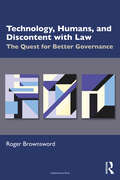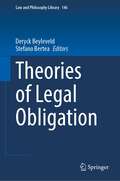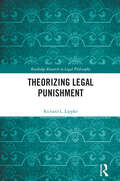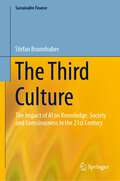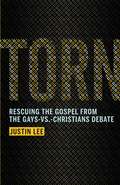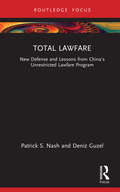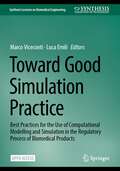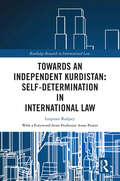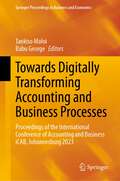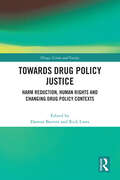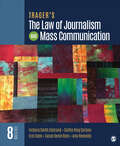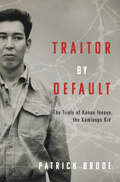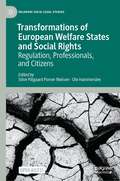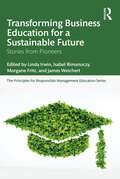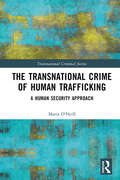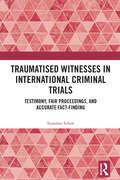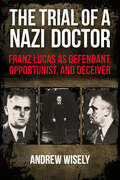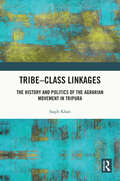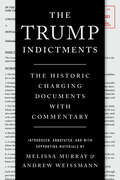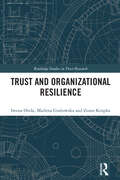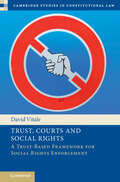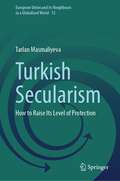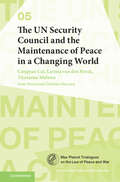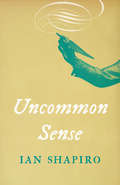- Table View
- List View
Technology, Humans, and Discontent with Law: The Quest for Better Governance
by Roger BrownswordThis book analyses discontent with law and assesses the prospect of better governance by technology. In the first part of the book, where the context is ‘low tech’, the range of discontent with law is examined; the underlying reasons for such discontent are identified (namely, the human nature of the legal enterprise, its reliance on rules, and the pluralistic nature of human communities); and the reasonableness of such discontent is assessed. In the second part of the book, where the context is ‘high-tech’ (with new tools becoming available to undertake governance functions), the question is whether discontent with law is further provoked or, to the contrary, is eased. While new technologies provoke further discontent with law’s claimed authority, its ineffectiveness, and its principles, positions, and policies, they also promise more effective and efficient ways of achieving order. The book closes with some reflections on the ambivalence that humans might experience when faced with the choice between law’s governance and apparently better performing governance by technology. That law’s governance is imperfect is undeniable; that humans should quest after better governance is right; but, the shape of our technological futures is unclear. This accessibly written book will appeal to scholars and students who are working in the broad and burgeoning field of law, regulation, and technology, as well as to legal theorists, political scientists, and sociologists with interests in the impact of new technology.
Theories of Legal Obligation (Law and Philosophy Library #146)
by Deryck Beyleveld Stefano BerteaThis volume collects six original essays by internationally respected researchers who have devoted themselves to the study of legal obligation. It brings together works that innovatively address key dimensions of the current debates concerning legal obligation from different and, in some cases, even opposing theoretical perspectives. As a result, the collection offers a comprehensive discussion of legal obligation that promises to significantly advance our understanding of the obligatory dimension of law. What specifically connects the contributions gathered here is one common thread: coming to terms with a notion – legal obligation – that is of both practical and theoretical importance. On the one hand, it is widely regarded as a fundamental legal concept by legal practitioners and laypeople alike, as not only judges, prosecutors, lawyers, and juries but also ordinary citizens make extensive use of obligation-related terms and discourses. On the other hand, the notion of legal obligation is of paramount significance for the theory of law. Indeed, even legal theorists who, quite understandably, refuse to reduce the law to a mere obligation-imposing device and opt instead for a view in which the normative dimension of the law also encompasses powers, rights, permissions, privileges and immunities, duly acknowledge the centrality of legal obligation for the understanding and conceptualisation of law. Hence the importance of the treatments presented in this volume.
Theorizing Legal Punishment (Routledge Research in Legal Philosophy)
by Richard L. LippkeThis book systematically defends an account of the institution of legal punishment that draws on both retributive and crime-prevention thinking. The work argues that legal punishment censures convicted offenders and thus morally communicates with them, any victims, and the broader community, while also serving to reduce future crime. The expressive or retributive element is assigned the lead role in this mixed account because it better captures the notion that members of society are to be held morally accountable for their failures to abide by defensible criminal prohibitions of various kinds. Despite this, it is conceded that the reduction of crime plays a vital role in justifying the institution of legal punishment and the book contains extended discussion of how and why this is so. Beyond its explication of the aims of legal punishment and their respective roles within a mixed theory, the study devotes separate chapters to sentencing, criminal procedure, and the imposition of fees and collateral legal consequences on individuals who have been convicted of crimes and fully served their sentences. In these ways, the work moves beyond discussion of the abstract aims of legal punishment to details of the institution’s internal structure and operations. The many historical deficiencies and failures of the institution are duly noted and the challenges they pose for punishment theorizing are examined. The book closes with discussion of the limited success of punishment institutions in apprehending, convicting, and punishing those who violate the law, including many who do so in serious ways. Alternatives to reliance on legal punishment institutions are briefly examined. In the end, retention of such institutions is urged although it is suggested that we ought to have modest expectations about their ultimate success. The work will be of interest to those working in the areas of Legal Philosophy and Criminology.
The Third Culture: The Impact of AI on Knowledge, Society and Consciousness in the 21st Century (Sustainable Finance)
by Stefan BrunnhuberWe are currently witnessing the emergence of a ‘third culture’, driven by unprecedented developments that are changing the playing field. These include advances in AI, big data analysis and robotics. The traditional ‘two cultures’ view (S. P. Snow) distinguishes between the sciences and the humanities. The wisdoms these two cultures offer are separated from each other, with little to no interaction or mutual comprehension. However, over the past two decades, and for the first time in human history, a new, third culture has appeared. This new culture, rooted in new technologies, not only pursues its own form of rationality but also supports advances in the original two cultures, deepening and expanding our individual and collective consciousness so that we can see more and do better. It will eventually give rise to new forms of consciousness based not on biochemical signals, but on copper wires and lithium chips. These new machine intelligences will change the world and force us to realise: we are no longer alone. The human species’ position in the twenty-first century will be fundamentally redefined: not as a conductor leading the orchestra, but a single string player within it.
Torn: Rescuing the Gospel from the Gays-vs.-Christians Debate
by Justin LeeAn evangelical Christian examines the impact of sexuality, the LGBTQ+ movement, and the future of the church in this thoughtful, deeply researched guide to navigating and mending the social and political division in our families and churches. As a teenager and young man, Justin Lee felt deeply torn. Nicknamed "God Boy" by his peers, he knew that he was called to a life in the evangelical Christian ministry. But Lee harbored a secret: He also knew that he was gay. In this groundbreaking book, Lee recalls the events--his coming out to his parents, his experiences with the "ex-gay" movement, and his in-depth study of the Bible--that led him, eventually, to self-acceptance. But more than just a memoir, TORN provides insightful, practical guidance for all committed Christians who wonder how to relate to gay friends or family members--or who struggle with their own sexuality. Convinced that "in a culture that sees gays and Christians as enemies, gay Christians are in a unique position to bring peace," Lee demonstrates that people of faith on both sides of the debate can respect, learn from, and love one another.
Total Lawfare: New Defense and Lessons from China’s Unrestricted Lawfare Program
by Patrick S. Nash Deniz GuzelThis book advocates for a novel doctrine of ‘total lawfare’ as part of a comprehensive approach to modern hybrid warfare.The book begins by introducing the military concept of ‘limited lawfare’ in the context of modern geopolitical conditions. It proceeds to set out a conceptual history of lawfare in the West, highlighting conceptual shortcomings and NATO’s limited capabilities in this branch of hybrid warfare. It then provides a comparative case study and strategic threat assessment of the Chinese concept of ‘unrestricted lawfare’. Against this, the book grounds an ethical doctrine of ‘total lawfare’ within the Western jurisprudential tradition and translates this into practice as a key pillar of modern defense strategy under the rule of law. The book concludes by advocating for a Thielian ‘New Defense’ industry centered upon ‘total lawfare’ as a legitimate and effective Western response to enemy aggression.The book will be of interest to academics, policy-makers, and students working in the fields of lawfare, jurisprudence, and military law.
Toward Good Simulation Practice: Best Practices for the Use of Computational Modelling and Simulation in the Regulatory Process of Biomedical Products (Synthesis Lectures on Biomedical Engineering)
by Marco Viceconti Luca EmiliThis open access book, the Community of Practice led by the VPH Institute, the Avicenna Alliance, and the In Silico World consortium has brought together 138 experts in In Silico Trials working in academia, the medical industry, regulatory bodies, hospitals, and consulting firms. Through a consensus process, these experts produced the first attempt to define some Good Simulation Practices on how to develop, evaluate, and use In Silico Trials. Good Simulation Practice constitutes an indispensable guide for anyone who is planning to engage at any title with In Silico Trials.
Towards an Independent Kurdistan: Self-Determination in International Law (Routledge Research in International Law)
by Loqman RadpeyKurdistan is among the world’s most notorious cases of self-determination denied, and the reasons why this outcome remains unachieved reveal as much about the biases of international law as they do about the merits of the case for Kurdistan. On the centenary of the Treaty of Lausanne, 24 July 1923, the last of the international instruments establishing the new international order after World War I, this book explores the potential blind spots of international law regarding its differential application in the Middle East. Tracing self-determination over the past century, the work explores how the law applies to Kurdish aspirations and to what extent the Kurds can rely upon the current law of self-determination to achieve internationally recognised statehood. The book offers an exhaustive historico-legal analysis of changing international legal concepts and geopolitical upheaval, providing a blueprint for Kurdish selfdetermination in international law. Shedding light on the law’s structural biases, it represents a comprehensive historico-legal account of Kurdish aspirations for territorial independence within international law literature, offering a guide to relevant legal problems. It will be of interest to students and academics focused on international law, specifically, peoplehood, statehood, secession, human rights law, political science, and anthropology. Moreover, policymakers, government officials working in peace and conflict, research and advocacy institutes, think tanks, as well as scholars of international relations, historians, political scientists, regional specialists, diplomats, and non-governmental organisation activists will find it a useful reference. The book also illuminates the human rights status of the Kurds in their host states, making it relevant to scholars and activists. Its findings have implications extending beyond Kurdistan to self-determination struggles in Scotland, Catalonia, Ukraine, and elsewhere.
Towards Digitally Transforming Accounting and Business Processes: Proceedings of the International Conference of Accounting and Business iCAB, Johannesburg 2023 (Springer Proceedings in Business and Economics)
by Tankiso Moloi Babu GeorgeThis conference volume discusses the findings of the iCAB 2023 conference that took place in Johannesburg, South Africa. The University of Johannesburg (UJ School of Accounting and Johannesburg Business School) in collaboration with Alcorn State University (USA), Salem State University (USA) and Universiti Teknologi Mara (Malaysia) hosted the iCAB 2023 conference with the aim to bring together researchers from different Accounting and Business Management fields to share ideas and discuss how new disruptive technological developments are impacting the field of accounting. The conference was sponsored by the Association of International Certified Professional Accountants AICPA & CIMA.
Towards Drug Policy Justice: Harm Reduction, Human Rights and Changing Drug Policy Contexts (Drugs, Crime and Society)
by Barrett, Edited by Damon Rick LinesTaking the shifting global drug policy terrain as a starting point, this collection moves beyond debates about whether to reform drug policies to a focus on delivering ‘drug policy justice’ – repairing the damage caused by the war on drugs as a component of reform efforts and safeguarding against future harms in legal markets. This book brings together some of the leading international thinkers and advocates on harm reduction and drug policy to introduce key questions in contemporary drug policy. Across five themes, and with contributions from different regions and disciplines, it explores ethical, legal, empirical and historical perspectives on delivering ‘drug policy justice’ from supply through to use. Essays cover a wide range of issues, from the effects of COVID on drug policy to securing economic and environmental justice, and from human rights in Asian drug policy to questions of race and equity in cannabis reforms, providing diverse insights on both prominent and overlooked drug policy challenges. Towards Drug Policy Justice is a benchmark text for scholars, students, advocates and policymakers as the book explores new models of global drug policy reform.
Trager′s The Law of Journalism and Mass Communication
by Victoria Smith Ekstrand Caitlin Ring Carlson Erin Coyle Susan D. Ross Amy ReynoldsTrager′s The Law of Journalism and Mass Communication provides a clear and engaging introduction to media law with comprehensive coverage and analysis for future journalists and media professionals. Grounded in the traditions and rules of law, along with fresh facts and examples, the authors demonstrate how the law functions in everyday life. The Eighth Edition of this bestselling text offers students a new breadth and diversity of material and brings the law to life with cutting-edge research, the latest court and legislative rulings, and a wealth of new content. Included with this title: LMS Cartridge: Import this title′s instructor resources into your school′s learning management system (LMS) and save time. Don′t use an LMS? You can still access all of the same online resources for this title via the password-protected Instructor Resource Site. Learn more.
Trager′s The Law of Journalism and Mass Communication
by Victoria Smith Ekstrand Caitlin Ring Carlson Erin Coyle Susan D. Ross Amy ReynoldsTrager′s The Law of Journalism and Mass Communication provides a clear and engaging introduction to media law with comprehensive coverage and analysis for future journalists and media professionals. Grounded in the traditions and rules of law, along with fresh facts and examples, the authors demonstrate how the law functions in everyday life. The Eighth Edition of this bestselling text offers students a new breadth and diversity of material and brings the law to life with cutting-edge research, the latest court and legislative rulings, and a wealth of new content. Included with this title: LMS Cartridge: Import this title′s instructor resources into your school′s learning management system (LMS) and save time. Don′t use an LMS? You can still access all of the same online resources for this title via the password-protected Instructor Resource Site. Learn more.
Traitor By Default: The Trials of Kanao Inouye, the Kamloops Kid
by Patrick BrodeAt the end of World War II, a young Japanese Canadian would stand trial and face execution for having committed war crimes and betraying his country.One of the most bizarre stories to emerge at the end of the Second World War was that of Kanao Inouye. Born in Kamloops, B.C., in 1916, he had relocated to his ancestral homeland of Japan, and by 1942 was a translator for the Japanese army. He was assigned to the prisoner of war camp in Hong Kong where he became infamous as one of the “most sadistic guards” over the Canadian survivors of the Battle of Hong Kong. Scores of prisoners would attest to his brutality administered in revenge for the treatment he had received growing up in Canada.His reputation was such that he was quickly apprehended after the war and faced charges of war crimes. But his subsequent trials became mired in questions as to who he really was. Was he a Canadian forced to serve in the Japanese military machine? Or was he a devoted soldier of his emperor obeying his superiors?
Transformations of European Welfare States and Social Rights: Regulation, Professionals, and Citizens (Palgrave Socio-Legal Studies)
by Stine Piilgaard Porner Nielsen Ole HammerslevThis open access edited book investigates European social rights in practice from socio-legal perspectives. It brings together fourteen socio-legal scholars, representing Nordic and Western European countries, who analyse different aspects pertaining to European social rights, namely the regulation of social rights, encounters between welfare professionals and citizens, and citizens’ mobilisation of social rights. These three different aspects from the structure for the sections in the anthology, each analysing transformations related to regulation, encounters and rights mobilisation. The book contributes to the existing literature as it focuses on interdependent transformations on macro, meso and micro levels which are key for understanding processes and contexts related to European social rights in practice. It speaks particularly to academics in sociology of law and/or regulation.
Transforming Business Education for a Sustainable Future: Stories from Pioneers (The Principles for Responsible Management Education Series)
by Linda Irwin Isabel Rimanoczy Morgane Fritz James WeichertAs the impact of climate change becomes more evident and dire, business leaders, educators, students, and academic leaders are deciding what they need to change and do to survive and thrive in a new and dramatically different environment. This book sets out how to transform business education and integrate sustainability practices into curriculum and a wider academic culture. While some universities around the globe are still teaching business practices that have contributed to human and environmental crises, pioneering educators and higher education institutions are researching, developing, and implementing programs to transform business education and practices. With stories from 26 administrators, researchers, and faculty across the globe, this book inspires business educators with innovative tools and creative solutions to address challenges in the business world and society. These pioneers are helping students and business ventures change the way they conduct business to survive and thrive in a fast-changing global environment. Their unique and personal journeys offer tools, models, lessons-learned, and inspiration for change. The book will both inspire and guide faculty members, administrators, students, and alumni to transform business education for a sustainable future.
The Transnational Crime of Human Trafficking: A Human Security Approach (Transnational Criminal Justice)
by Maria O'NeillHuman trafficking is a multi-faceted crime. It suffers from definitional and implementation problems. One facet, the focus of this book, is the transnational nature of much of the crime, and the need for practitioners to operate across borders to combat it. Europe has taken a distinctive approach to cross border law enforcement and judicial cooperation, which could be used as a model in other areas of the world. This publication examines these problems from a Council of Europe and European Union perspective, including the now post-Brexit UK. The UK has adopted a distinctive approach to legislating and operationalising its trafficking in human beings (THB) legal frameworks, also legislating for “slavery, servitude, forced and compulsory labour”, resulting in distinctive results in internal UK law enforcement. It is argued here that this approach and the results should inform THB legislative and operational developments more widely. Further action in legal and operational frameworks is, however, clearly needed and the book advocates the adoption of a human security “freedom from fear” approach. Ultimately, the interaction of different legal frameworks, and different jurisdictions requires transnational practitioners to adopt a constructivist approach, as was adopted for the development of the internal EU area of freedom, security and justice. The book will be of interest to academics, researchers and policy-makers working in the areas of transnational law, migration law, criminology and international relations.
Traumatised Witnesses in International Criminal Trials: Testimony, Fair Proceedings, and Accurate Fact-Finding
by Suzanne SchotThis book focuses on the testimonial evidence of traumatised witnesses in trials of international crimes, which deal with acts of genocide, war crimes and crimes against humanity. Such trials often involve the testimonies of those who experienced or witnessed extremely traumatic events, which can make it hard for these witnesses to recall specific details. Testifying during trial may in itself also pose challenges to their well-being. Yet the legal process of determining whether someone can be held criminally responsible for the alleged crimes needs to be fair, in accordance with the right to a fair trial of the accused, and the facts need to be determined as accurately as possible. This book argues that to ensure fair and accurate fact-finding when in particular traumatised witnesses testify, a balance needs to be struck between the needs of witnesses who testify about traumatic experiences, the fair trial rights of the accused and the objective of the court to establish as accurately as possible the responsibility of the accused. This is crucial throughout the stages of selecting, preparing, presenting and assessing the testimonial evidence of traumatised witnesses. The methodology involves an analysis of transcripts of proceedings and case law of the International Criminal Tribunal for the former Yugoslavia, the International Criminal Court and Dutch courts prosecuting international crimes. The research demonstrates that it is often difficult to strike a balance between the competing objectives during proceedings when traumatised witnesses testify due to the current lack of regulations and guidelines applicable during investigations and prosecutions. This book shows that this balance can, and should, be achieved when traumatised witnesses testify during criminal proceedings for international crimes. The work is an invaluable resource for researchers, academics and practitioners in criminal law, criminology, legal psychology, legal psychiatry, social anthropology and forensic sciences.
The Trial of a Nazi Doctor: Franz Lucas as Defendant, Opportunist, and Deceiver
by Andrew WiselyThe Trial of a Nazi Doctor examines the life of Franz Bernhard Lucas (1911-1994), an SS camp doctor with assignments in Auschwitz, Mauthausen, Stutthof, Ravensbrück, and Sachsenhausen. Covering his career during the Third Reich and then his prosecution after 1945, especially in the Frankfurt Auschwitz trial, Andrew Wisely explores the lies, obfuscations, misrepresentation, and confusions that Lucas himself created to deny, distract from or excuse his participation in the Nazi’s genocidal projects. By juxtaposing Lucas’s own testimonies and those of a wide range of witnesses: former camp inmates and Holocaust survivors; friends, colleagues, and relatives; and media observers, Wisely provides a nuanced study of witness testimonies and the moral identity of Holocaust perpetrators.
Tribe-Class Linkages: The History and Politics of the Agrarian Movement in Tripura
by Saqib KhanThis book is a historical study of the development of agrarian class relations among the tribal population in Tripura. Tracing the evolution of Tripura and its agrarian relations from monarchy in the nineteenth century to democracy in the twentieth century, the book discusses the nature of the erstwhile princely state of Tripura, analyses the emergence of differentiation within tribes, and documents the emergence of the tribal movement in the state. It specifically focuses on the tribal movement led by the Ganamukti Parishad, beginning with the historic revolt of 1948-51 against state repression on the tribal people, followed by the mass movements in the 1950s and 1960s, which were founded on a recognition of class relations and the slogan of unity across the tribal and non-tribal (Bengali) peasantry. The first of its kind, the book will be indispensable for students and researchers of tribal studies, agrarian studies, exclusion studies, tribe-class relationships, minority studies, sociology, development studies, history, political science, north-east India studies, and South Asian studies. It will also be useful for activists and policymakers working in the area.
The Trump Indictments: The Historic Charging Documents With Commentary
by Melissa Murray Andrew WeissmannCollecting the four unprecedented indictments against Donald Trump, this essential volume features extensive commentary by NYU law professors and MSNBC contributors Melissa Murray and Andrew Weissmann. <p><p> In the long span of American history, Donald Trump is the first former president to face criminal indictment. He is the subject of a series of explosive charges across four cases: the January 6 case brought by Special Counsel Jack Smith; the election interference case in Georgia; the classified documents case also brought by Special Counsel Jack Smith; and the "hush money" case in New York. The Trump Indictments includes: • An introduction offering historical background and international comparisons for criminal charges against a former political leader. • The four indictments with annotations throughout, including insider notes from an eminent scholar (Murray) and a former federal prosecutor (Weissmann). • A cast of characters, from Trump and his alleged co-conspirators to notable Proud Boys and Oath Keepers who face prison sentences as a result of related January 6 cases. • A timeline that brings together in one place the critical events that led to the four indictments. A necessary handbook for anyone following the trials in 2024, The Trump Indictments will endure as an indispensable record of a democracy at the crossroads. <p> <b>New York Times Bestseller</b>
Trust and Organizational Resilience (Routledge Studies in Trust Research)
by Iwona Otola Marlena Grabowska Zoran KrupkaIn a turbulent environment, companies face disruptive events and must build organisational resilience in order to thrive. This unique book offers new, cutting-edge research on how trust can build and develop resilience. The authors combine theoretical and empirical perspectives on the two issues of trust and organisational resilience in an environment that is difficult to predict. The authors firstly discuss the challenges the turbulent environment poses before exploring the influence of trust and providing practical case studies on topics such as brand trust, dynamic capabilities and business models. Examples are drawn from high-growth enterprises demonstrating first-hand how organisations that develop trust have survived turbulent conditions. This novel book is the first to combine the two disciplines of trust and resilience and will be a valuable reference for researchers and upper level students of strategic management and crisis management in particular.
Trust, Courts and Social Rights: A Trust-Based Framework for Social Rights Enforcement (Cambridge Studies in Constitutional Law)
by null David VitaleTrust, Courts and Social Rights proposes an innovative legal framework for judicially enforcing social rights that is rooted in public trust in government or 'political trust'. Interdisciplinary in nature, the book draws on theoretical and empirical scholarship on the concept of trust across disciplines, including philosophy, sociology, psychology and political theory. It integrates that scholarship with the relevant public law literature on social rights, fiduciary political theory and judicial review. In doing so, the book uses trust as an analytical lens for social rights law – importing ideas from the scholarship on trust into the social rights literature – and develops a normative argument that contributes to the controversial debate on how courts should enforce social rights. Also global in focus, the book uses cases from courts in Africa, Europe, Latin America and North America to illustrate how the trust-based framework operates in practice.
Turkish Secularism: How to Raise Its Level of Protection (European Union and its Neighbours in a Globalized World #12)
by Tarlan MasmaliyevaThere are any number of studies on Turkish secularism. However, to date there has never been a comprehensive analysis of the constitutional protection of secularism, one that systematically covers all relevant aspects. Addressing that gap, this book presents a comprehensive and coherent analysis of the constitutional framework of this principle within the Turkish legal system.Secularism is a common fundamental principle of all three Turkish constitutions (1924, 1961, 1982). The principle has been granted an irrevocable status and has been strictly constructed within the Turkish constitutional system. Despite the guarantee of irrevocability, however, its interpretation and application have undergone a drastic transformation in response to changing social and political circumstances.Today, the complaints filed before the domestic and international judiciary predominantly concern the Turkish State’s neutrality and impartiality towards religion and the exercise of freedom of religion by religious minorities. While many observers have interpreted these problems in light of the contemporary policies pursued in the field of religion, a closer look reveals that the problem lies deeper in Turkey’s general constitutional framework. While the 1982 Constitution declares the principle as an unamendable characteristic of the Republic and protects it with multi-layered mechanisms, certain anti-democratic features of the Constitution, including the President’s predominant role in forming the high-ranking judiciary, affect the proper and consistent application of the principle of secularism.The consolidation of the secular state order depends on various factors other than a suitable constitution. However, it goes without saying that constitutions can help or hinder efforts to find solutions. Therefore, this book identifies the deficiencies in the Turkish constitutional and legal framework regarding the protection of secularism. It presents the historical development and definition of a secular state, analyzes the jurisprudence of the Turkish Constitutional Court and the European Court of Human Rights, studies the application of the party prohibition mechanism as a means of protecting the principle, and assesses the constitutional amendments of 2001, 2010 and 2017. Moreover, it proposes much-needed constitutional and legal amendments with a view to improving the application of the principle of secularism.
The UN Security Council and the Maintenance of Peace in a Changing World (Max Planck Trialogues)
by null Congyan Cai null Larissa van den Herik null Tiyanjana MaluwaHow can the UN Security Council contribute to the maintenance of international peace and security in times of heightened tensions, global polarisation, and contestation about the principles underlying the international legal and political order? In this Trialogue, experts with diverse geographic, socio-legal, and ideational backgrounds present their perspectives on the Security Council's historic development, its present functions and deficits, and its defining tensions and future trajectories. Three approaches engage with each other: a power-focused approach emphasising the role of China as an emerging actor; an institutionalist perspective exploring how less powerful states, particularly the elected members of the Security Council, exert influence and may strengthen rule-of-law standards; a regionalist perspective investigating how the Security Council as the central actor can cooperate with regional organisations towards maintaining international peace and security. This title is also available as Open Access on Cambridge Core.
Uncommon Sense
by Ian ShapiroA spirited defense of the Enlightenment against assaults from both the left and the right that explains its urgent implications for our contemporary politics Ours is an age when optimism about politics is hard to come by. Ian Shapiro explains why this is so and, without minimizing the daunting challenges, spells out an appropriate response. Written in the indomitable spirit exemplified by Tom Paine, Uncommon Sense is a rich source of insight and inspiration in dark political times. The Enlightenment commitments to reason and science are under assault from the Postmodern Left and the Authoritarian Right. Shapiro explains why the attacks are misguided and politically destructive. He agrees with the critics that there are no universal principles of justice that transcend political battles and no fair, impartial rules to govern the distribution of income, wealth, rights, or opportunities. But abandoning the search for them as futile does not mean junking the Enlightenment&’s core political goal: to deploy the tools of reason and science to fight domination. Democracy is essential to vindicating that goal, yet citizens in many democracies are profoundly alienated and many democracies are in danger of failing. Shapiro explains what has gone wrong, debunks ill-considered remedies, and spells out better ones—deepening and extending his previous writing on political theory and democratic politics.
